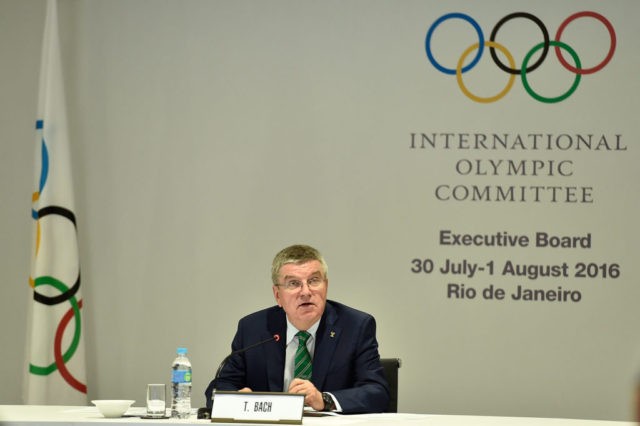RIO DE JANEIRO (AP) — IOC President Thomas Bach on Sunday defended the committee’s decision not to ban Russia’s entire Olympic team and said the country’s doping scandal will not damage the credibility of the Rio de Janeiro Games.
Speaking at a news conference five days before the opening of the games, Bach said a total ban on Russia “would not be justifiable” on either moral or legal grounds.
“Every human being is entitled to certain rights of natural justice,” he said.
Bach was peppered with questions about the International Olympic Committee’s handling of the allegations of state-sponsored doping in Russia, including the decision to give international sports federations the power to decide which Russian athletes should be cleared to compete.
Bach said he hopes the public will “realize we did our best to address the situation in a way which allows us to protect clean athletes all over the world.”
Bach said the IOC had set a “very high bar” by imposing strict conditions on the entry of Russians, including a ban on any athletes with prior doping sanctions.
With the games opening Friday, it remains uncertain exactly how many Russians will be competing. Some have filed appeals against their bans.
“‘I don’t think that this in the end will be damaging because people will realize we have to take this decision now,” Bach said.
The IOC on Saturday set up a panel of three executive board members who will have the final say on which Russians are let into the games, based on advice from an independent expert appointed by the Court of Arbitration for Sport.
Bach and the IOC have been roundly criticized by anti-doping bodies, athletes’ groups and Western media for not imposing a total ban on Russia.
Pressure for the full sanction followed a World Anti-Doping Agency report by Canadian lawyer Richard McLaren that accused Russia’s sports ministry of overseeing a vast doping conspiracy involving the country’s summer and winter sports athletes.
Russians who have been banned so far include the 67 track and field athletes barred as a whole by the IAAF, and more than 30 others who have failed to meet the IOC’s new eligibility criteria.
Bach rejected suggestions that the IOC’s response had been a failure, and took a shot at WADA for not having acted earlier based on whistleblower evidence of cheating in Russia, and for having accredited the Russian doping labs at the center of the scandal.
“The IOC is not responsible for the timing of the McLaren report,” Bach said. “The IOC is not responsible for the fact that different information which was offered to WADA already a couple of years ago was not followed up. The IOC is not responsible for the accreditation or supervision of anti-doping laboratories.
“Therefore, the IOC cannot be made responsible, neither for the timing nor for the reasons of these incidents we have to face now, and which we are addressing and have to address just a couple of days before the Olympic Games.”
Bach also defended the IOC decision to reject a bid by 800-meter runner Yulia Stepanova, a former doper and whistleblower who helped expose the extent of cheating in Russia, to compete in Rio as a neutral athlete.
“It was not easy,” he said. “The executive board made it really clear that it appreciates the contribution of Yulia Stepanova in the fight against doping.”

COMMENTS
Please let us know if you're having issues with commenting.